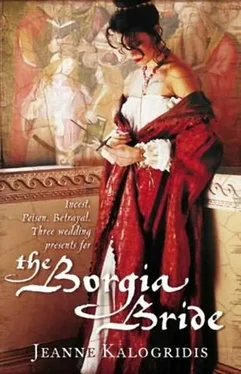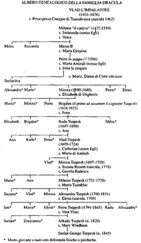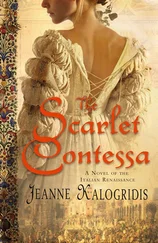Alfonso eyed me sombrely. ‘We have never met the Borgias, so we cannot judge them. And even if every word of gossip about His Holiness is true, you are not being fair to Jofre. Sons are not always like their fathers.’
His latter statement silenced my objections. Even so, I had to ask, in the most dolorous tone, ‘Why must there be marriage? It only takes us away from those we love.’
But for Alfonso’s sake, I vowed to myself, I would not be selfish. I would try to be like him-brave and good, and willing to do what was best for the realm.
Many months passed, and 1493 arrived. The more I contemplated marriage to a Borgia, the more concerned I became. King Ferrante could insist that Jofre and I maintain a household in Naples, and could commit it to writing. But a pope’s word held more authority than a king’s. What if Alexander changed his mind, and called his son back to Rome? What if he demanded a separate kingdom for Jofre elsewhere? I would be bound to accompany my husband. Only a Neapolitan husband would do, one who would never have reason to take me from my native city.
Since the day I had discovered Ferrante’s leering mummies, my religious faith had been tentative, half-hearted. Now I embraced it full force, in a desperate test. I called one morning for a private carriage and slipped away, accompanied by a single guard and a driver.
I headed for the Duomo, startling the stray worshipers inside, who were abruptly herded out by my guard.
At the altar where the miracle had occurred, I knelt. There, with all my sincerity, I prayed to San Gennaro. I begged him to free me from my engagement to Jofre Borgia, to find me a good Neapolitan husband. Together, I promised, we would donate vast sums of money for the upkeep of the Duomo and for the care of Naples’ poor.
When I returned to the castle, I requested and received a painting of the saint. In my bedchamber, I erected a small shrine to Gennaro, where I repeated my promise morning and evening. Once a week, I arranged a private excursion to the Duomo. Esmeralda was pleased.
How nice , everyone said, that she is calming down and becoming devout. No doubt it is because she is to marry the Pope’s son next year .

I continued my regular devotions and fought not to become discouraged. The simple act of prayer brought with it a temporary peace, and I found myself adding to my original selfish request. I asked for the continued health of Alfonso, my mother, and Donna Esmeralda; I asked for health to be restored to old Ferrante, who was failing. I even prayed for a miracle so great I dared not believe in its possibility: that my father’s heart might be opened, that he might become happy and kind.
One late summer afternoon, a royal aide came to fetch me to Ferrante’s chambers. I was confused; I turned to Donna Esmeralda for support. I had done nothing of late to displease my elders; if anything, I had behaved circumspectly. In fact, in my hand was a Latin translation of the Proverbs; before the aide arrived, I had been reading the last one:
A perfect wife-who can find her?
She is far beyond the price of pearls .
Her husband’s heart has confidence in her ,
from her he will derive no little profit .
Advantage and not hurt she brings him
all the days of her life .
San Gennaro , I had prayed, grant my petition and I will become thus .
I was dressed in the black, full-sleeved gown of the southern noblewoman; I had worn no colour since the announcement of my second engagement. Before leaving, I set down the little book, touched the small gold crucifix at my throat, then followed the King’s aide. Esmeralda stayed close by my side.
The door to the throne room was flung open; the chamber itself was empty. But as we crossed the marble floor, I heard sounds of agitation and anger coming from the King’s office.
The aide opened the door and ushered us inside.
Ferrante sat at his desk, his face starkly scarlet against his white beard. Queen Juana sat beside him, trying to calm him, only occasionally succeeding at capturing one of his wildly gesticulating hands and stroking it in an effort to soothe. Her murmurs were drowned out by my grandfather’s shouts. Beside them both stood my grim-faced father.
‘Roman son of a sow!’ Ferrante caught sight of me, and by way of explanation, waved at a letter on the desk. ‘The bastard has appointed his new College of Cardinals. Not a soul from Naples among them, despite the fact we had several qualified candidates. And he appointed two Frenchmen. He mocks me!’ My grandfather slammed his fist on the desk; Juana tried to clutch it, but he pulled it away. ‘The lying son of a whore mocks me!’
He drew a sudden wheezing breath, then put a hand to his brow as if dizzied.
‘You must calm yourself,’ Juana said with uncharacteristic firmness, ‘or I will send for the physician.’
Ferrante paused a moment and forced himself to slow his respiration. When he spoke again, it was more deliberately. ‘I will do better than that.’ He glanced up at me. ‘Sancha. I will not permit the wedding to go through until this situation is rectified. I will not allow a princess of the realm to be married to the son of a man who mocks us.’ He glared down at the letter on the desk. ‘Alexander must be taught that he cannot extend one hand to us, then betray us with the other.’
My grandfather had not forgotten the crime committed against him decades earlier by Alexander’s uncle Alonso, also known as the pontiff Callixtus III. Callixtus, disapproving of an illegitimate commoner like Ferrante taking Naples’ throne, had supported the Angevins.
As desperately as Ferrante needed the new Pope’s support, he had never entirely forgiven the Borgias.
My father’s tone was urgent. ‘Your Majesty, you are making a grave mistake. Some of the cardinals are old. They will die soon, and then we can lobby for their replacement with loyal Neapolitans. But the fact that the French now have a voice in the Vatican makes a liaison with the papacy all the more imperative.’
Ferrante turned on him, and with the candour born of ill health and old age, said, ‘You were always a coward, Alfonso. I have never liked you.’
An unpleasant silence ensued. At last, my grandfather looked back at me and snapped, ‘That’s all. Go on, then.’
I curtsied, then left before I betrayed my joy with a smile.
For four months, from the beginning of fall into the depths of winter, I was blissful. I added words of thanksgiving to my daily prayers. San Gennaro, I was convinced, had decided my pious behaviour earned me the right to remain with my brother.
And then something occurred which everyone but I had expected.
Winter and summer in Naples are both temperate, but one rare night in late January 1494, it turned so bitterly cold that I invited Donna Esmeralda and another lady-in-waiting into my bed. We piled fur blankets high, and still shivered.
I slept fitfully, given the cold; or perhaps I sensed evil coming, for I was not as surprised as I should have been when a loud knock came at the door to my outer chamber. A male voice called, ‘Your Highness! Your Highness, it is urgent!’
Donna Esmeralda rose. Limned by the fireplace, the soft, downward-sloping curves of her body, covered in a white wool nightgown, took on a coral glow. Shaking with cold, she clasped a fur throw about her; a single thick braid fell forward onto her shoulder, over her breast, past her thick waist. Her expression was one of alarm. An interruption at such an hour could not bring happy news.
I rose from the bed and lit a candle while, in the outer chamber, low voices murmured. Esmeralda returned almost at once; her expression was so stricken that I knew even before she spoke what she would say.
Читать дальше
Конец ознакомительного отрывка
Купить книгу













